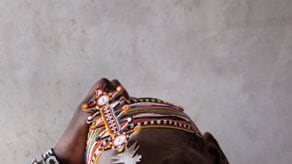When Rebecca Lolosoli won her right to a divorce this past December, 300 women gathered to celebrate. They roasted a goat in her village, Umoja, which the women founded 21 years ago for women only. No men are allowed to live here.

"Our village has turned into a shelter," Lolosoli says. Women and girls fleeing forced marriages, or ostracized for being raped, or trying to save themselves from female genital mutilation, come to Umoja in Kenya for safety. Sons are welcome—as long as they are willing to follow the village's rules and do not try to dominate the women.
The women formed the village in order to protect one another.
Now, in addition to being a safe haven and a matriarchal utopia, Umoja is the center of a thriving artisans' community, which centers around beadwork. Their wide, bright necklaces and elaborate headpieces are now de rigueur among folk-art fashionistas. Diane Von Furstenberg met Lolosoli in 2009. Last year, Von Furstenberg introduced the Samburu women's intricate, sophisticated beadwork into her spring collection.
In Swahili, Umoja means unity. Many of the 64 women who live there are rape survivors. The perpetrators were often British soldiers who were stationed and trained nearby for more than 50 years.
"Wearing green uniforms they blended with the trees and when women collected firewood, the soldiers would jump out and rape them, laughing like it was a game," Lolosoli says. She herself narrowly escaped attack by British soldiers several decades ago. (She doesn't know her exact age, but guesses she's around 48.)
Once, a group of 40 warriors beat the women in front of tourists to try to make it look like the village was corrupt.
At first, rape survivors said nothing. When their husbands found out, the women were cast out of their families and villages as a result of the shame of their violation. To survive, some brewed and sold homemade beer, which was illegal, so they went to jail. Others were eaten by hyenas.
Finally, more than two decades ago, Lolosoli decided it was time to speak up on their behalf, no matter the consequences. She started attending community meetings to address this taboo.
Yet nothing really happened until people began complaining about other things. Children were blowing up used condoms left by soldiers, for example. No one knew what they were, Lolosoli says, they thought they were some kind of medical apparatus.
Charismatic and confident, Lolosoli kept speaking out.
"We knew it would be dangerous," she says. To silence her, Lolosoli was beaten severely by four men while her husband was traveling. When Lolosoli got out of the hospital and returned to him, he said nothing about the attack. She realized then that she would be killed—that he wouldn't protect her.
"We are like property because we are part of the dowry," she says. Lolosoli nearly died when women held her down and cut her vagina with a razor when she was 15. Three years later, her husband bought her for 17 cows. "A Samburu woman does not have a single right."
So she left him. Then her husband stalked her with a gun, and attempted to scare Lolosoli into handing over the plot of grassland that she had secured for the women of Umoja.
Samburu women are not allowed to own land, to get divorced, to work, and the list goes on. Lolosoli's life's work centers on teaching women about their most basic rights—to education, health, and self-empowerment. The women of Umoja help support themselves by running a camping and cultural site for visitors to the Samburu National Reserve. Eventually, they earned enough money from tourism that they were able to buy their own village's land for $2,700.
Lolosoli has also built a larger network of 60 other women's groups. For those who live far from the game park, she helps train women in how to secure small jobs, like selling livestock, sugar, and salt. "Even if they sell three goats," she says, "they have something in their pockets so they aren't dependent on their husbands."
Education, Lolosoli says, is the first step toward changing the status quo. That's why a girl's right to go to school is the most critical issue Samburu women face.
"Education is most important so they won't be in the dark like us."
From selling goats to stringing beads, Lolosoli's work on behalf of Samburu women has led her into the international spotlight.
Despite her startling success, Lolosoli's path has never been easy an easy one. She grew up as one of six children; her father had three wives. Early on, she enrolled in a Catholic nurse's training course, but she had to drop out after six months because she couldn't afford the fees. Jealous husbands and men established a rival village nearby and have repeatedly tried to sabotage Umoja's success. Once, a group of 40 warriors beat the women in front of tourists to try to make it look like the village was corrupt.
"My life is in danger up to now," she says.
This most recent development has turned up the tension once again. Lolosoli, a mother of five, is now the first woman among her people, the Samburu of Kenya, to ask for—and receive—a divorce.
Two months ago, when the verdict was announced, her husband burst into tears in the courtroom.
"I will get hold of you again," he threatened.
Such bluster doesn't slow Lolosoli down, not for a minute. Her next goal is to be the first woman to run for local government in next year's election in Kenya.
"Even in danger, I've never stopped," she says.
Eliza Griswold, a senior fellow at the New America Foundation, is the author of The New York Times bestseller The Tenth Parallel.






